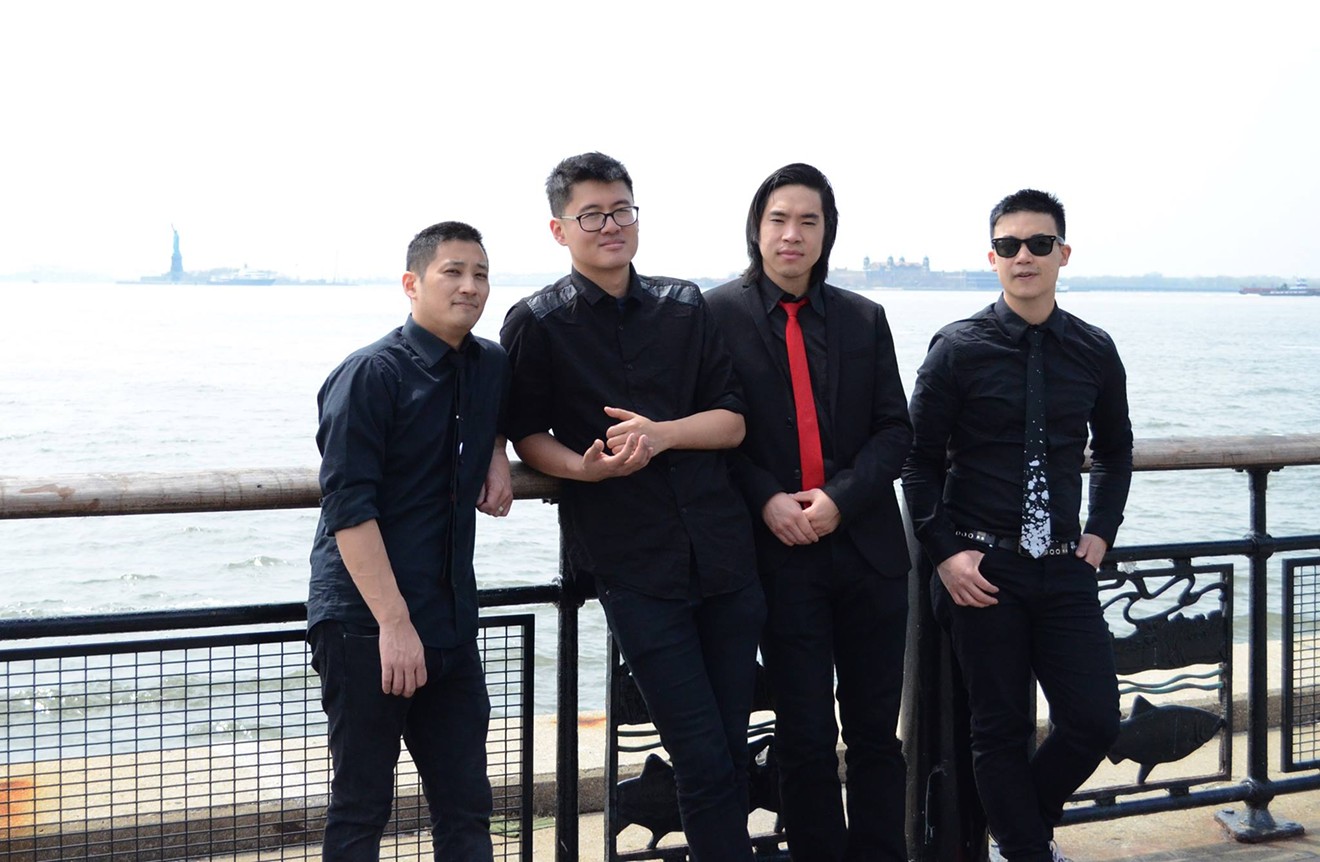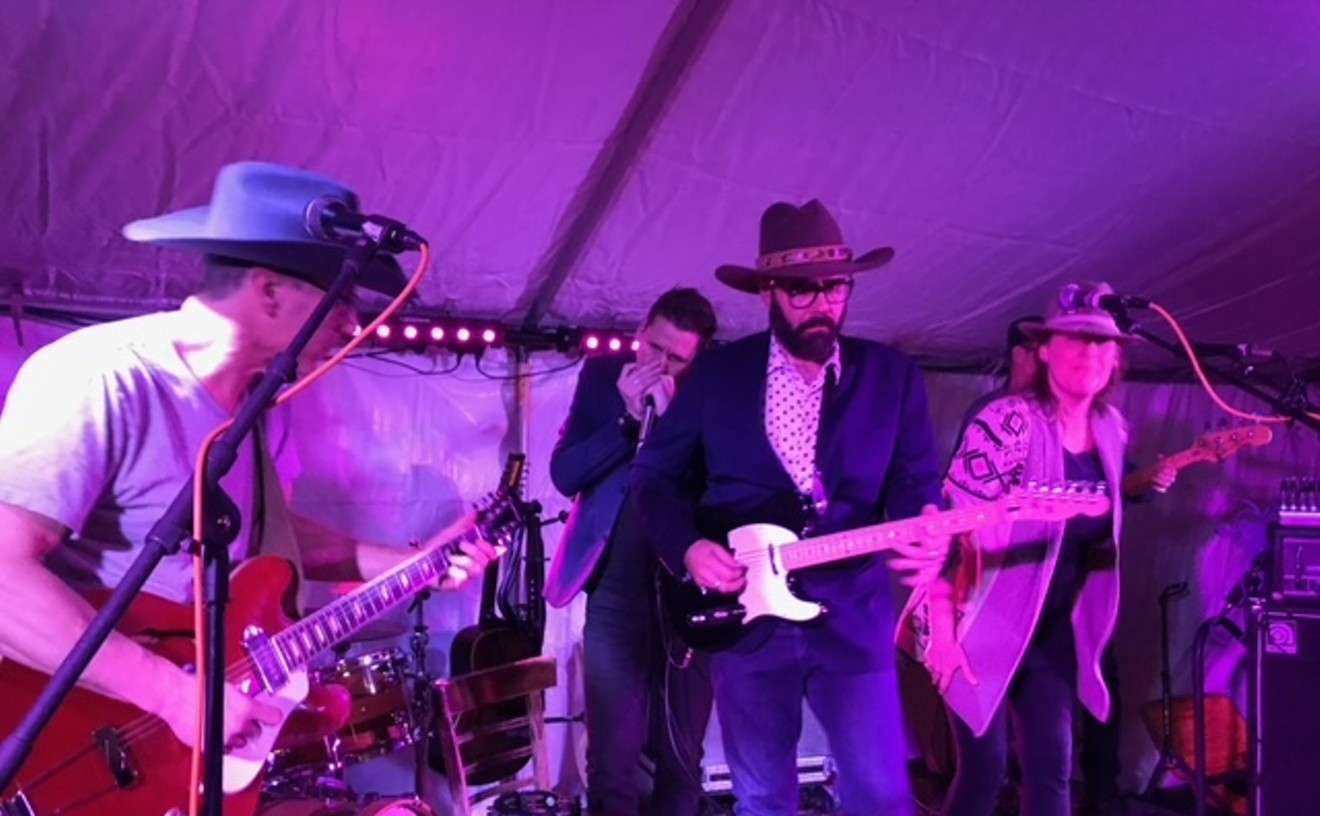Slants founder Simon Tam was baffled. Suddenly, his band, which is made up of Asian-American members and has prided itself on its anti-racist politics, was being accused of racism by the very government he and his fellow musicians often criticized for its structurally racist policies. For roughly seven years, the band has been wrangling with the Trademark Office, and the case is now before the Supreme Court.
Despite years in court, the musicians still perform. They replaced one lead singer with another; ditto for their drummer. Two dozen tours and multiple full-length albums in, they are just releasing their first EP: The Band Who Must Not Be Named, a jab at the Trademark Office.
Ahead of the Slants show at the Walnut Room, Westword caught up with founder and multi-instrumentalist Tam to talk about the case and life on the road as an anti-racist rock band.
Westword: Can you give us an overview of what the Supreme Court case looks like and where things are with it right now?
Simon Tam: Right now our case is pending before the Supreme Court, and what it involves is a much larger issue, and that's whether or not this law called Section 2A of the Lanham Act is an abridgment or a violation of the First Amendment. The law itself states that the Trademark Office cannot register trademarks that contain matter that is considered scandalous, immoral or disparaging. It doesn't necessarily have to disparage, but if it may be considered any of those things, then it's subject to review and denial under this law.
What different people have said is, "Hey, this is actually an abridgment of the First Amendment, because what it's doing is it limits speech in a certain way, and in that way, here is viewpoint discrimination." In other words, if the government does or doesn't like what you say, from that they can decide whether or not you get rights just like anybody else. That's the one side. The other side is that the government has a legitimate interest in not being associated with things that they don't want to be associated with. That side tends to see it as a government benefit or a government program, where the government gets to decide who are the winners and losers.
How does that tension play out between the government's desire to control what your name can be and your own rationale behind using that name?
Sure. To be clear, the government isn't saying we can't use the Slants as a name. What they're saying is that we can't register the name as a trademark. By a virtue of us not receiving the registration, we're not entitled to certain government benefits, like the substantial benefits provided from having a trademark registration. For us, it's been interesting, in that one of the biggest reasons why I've chosen to fight — why I've dedicated almost a quarter of my life to being in court and chosen to use so many resources into fighting this case — was that it was about principle.
For me and for other members of the band, the Slants isn't racist. It's not disparaging in the least. What we're doing is actually empowering. It's about the right for self-identification and for us to use and re-appropriate an outdated racial slur into something that is meaningful and can be used as a driver for social change. When the government's saying we're racist, to me, that's a pretty hefty charge, and if you're going to make that kind of accusation, you've got to bring some pretty significant evidence to back that up. In fact, the government says that. According to the government's trademark policies and procedures, they should always give the benefit of the doubt to the applicant, and they need substantial evidence to show that a "composite" of the group, or Asian-Americans, are indeed disparaged by it.
The problem is that they've not ever produced any evidence, outside of using urbandictionary.com, photos of Miley Cyrus pulling her eyes back in a slant-eyed gesture, and then referencing dictionaries from the 1930s and ’40s. They never once talked to a single Asian-American group or a social-justice group or a leader or a representative or anything like that. And so we're basically being slammed by one part of the government based on some white-supremacist websites and Wiki sites that have actually no real reliable evidence at all.
It's actually pretty amusing when you consider the fact that other areas of the government have no problems with us whatsoever. So like a month before we went before the Supreme Court, we were e-mailed by the White House, and we were called champions of the Asian-American community and asked, believe it or not, asked to participate in a compilation album with Barack and Michelle Obama and numerous representatives, leaders, actors, athletes and musicians from the Asian-American community as part of this massive outreach to the Asian community. And the song they chose was our open letter to the trademark office.
Wow.
It's just kind of mind-blowing to think, how does this actually work when one part of the government is saying we're racist and other parts of the government are like, "Please help us with our racism."
I'm curious how your anti-racist politics have shifted from the Obama administration to the Trump administration.
Obviously the current president has not had the nicest things to say about communities of color or other marginalized groups, but for us, when we talk about our anti-racism work, we're very much talking about fighting the system or institutions or these cultural norms that are much bigger than any single president or whatever political party is in control of the house or Senate. We're talking about legacy policies that have existed for decades, and sometimes centuries, that have a disproportionate impact on certain vulnerable communities.
The law we're fighting against has a noble and ambitious goal. Nobody wants to see people benefiting from using racist hate speech or anything like that. But when the law is disproportionately applied to communities of color or people who are members of the LGBTQ community, it just shows there is something inherently wrong with the law. We're placing additional burdens on people who don't have the resources to fight the law — unlike extremely wealthy football teams that have racist names. When we talk about fighting racism, we're thinking about it through what we call an equitable lens — like, we don't want to just be treated equally; we want to be treated equitably, and that means taking the considerations of each community group into account.
I'm curious how your politics translate into your songwriting and performances?
In terms of our values and the activism we wear on our sleeves?
Yeah.
I would say sometimes it appears more than others. It just really depends. Like any other artist out there, we write what's close to our hearts and what seems to be fitting, given the tone of the song. We start out with the music part of it first. It's also changed a bit, because we've had different members come and go into this group. With the current lineup, we've talked more about integrating that activism approach and making it a little bit more obvious in some of our music, whereas before it was veiled in personal experiences, in songs about touring or love or that kind of thing.
I would say for the first time, we're writing songs — like, we wrote one called "Anthem," that's about the Black Lives Matter movement and about police violence. We have a song that's about the lack of transparency from elected officials. If anything, we're getting a little bit more political, but it's still very much through our art and through the music.
In terms of our values and the activism we wear on our sleeves?
Yeah.
I would say sometimes it appears more than others. It just really depends. Like any other artist out there, we write what's close to our hearts and what seems to be fitting, given the tone of the song. We start out with the music part of it first. It's also changed a bit, because we've had different members come and go into this group. With the current lineup, we've talked more about integrating that activism approach and making it a little bit more obvious in some of our music, whereas before it was veiled in personal experiences, in songs about touring or love or that kind of thing.
I would say for the first time, we're writing songs — like, we wrote one called "Anthem," that's about the Black Lives Matter movement and about police violence. We have a song that's about the lack of transparency from elected officials. If anything, we're getting a little bit more political, but it's still very much through our art and through the music.
For us, we're musicians, and it has to be genuinely good music and music we can stand behind. It kind of depends on the song. It probably depends on the day. There are some moments where we just want to write a fun song. Other times, when the country is hurting and in pain, we feel that pain, too, and if we just happen to be writing a song at the time, it may very well be reflected in that.












